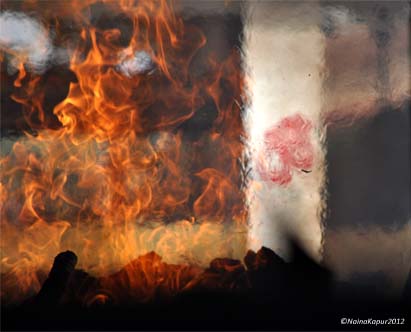Sometime in the late '80s I traveled to south India to visit a forensics institute. Working on sexual violence at the time, my colleague and I wanted to find out how forensics collected "evidence" in sexual abuse cases. Walking through the outer grounds of the institute, we came across five bodies, lying in a row near the lab. A doctor, guiding us, said they were victims of an accident now going for post-mortem. Spontaneously I requested if I might watch the post-mortem. He readily agreed.
I found myself standing next to a table on which lay a body that had just been cut open down the middle. The doctor conducting the post-mortem, eagerly explained his process and one by one presented before me an organ: "This is the heart," he announced. "Here, the lungs," he continued. "Ah yes and there we have the stomach -- shall we examine and see what he ate?" he asked rhetorically, delighted by the prospect of what he might find. As he spoke, I found myself drawn into the details of an open cavity; empty of its many organs-- and before me a doctor wielding stomach contents and a dormant heart. Lentils and rice was the only reminder that activity had once taken place within this shell. As he spoke, my attention was drawn to another table where a medical team had opened the skull of second body and were removing the brain. It was like watching a genie expand out of its bottle -- how would it ever fit back in, I wondered and to what end? For some reason, I began to imagine Indira Gandhi's autopsy post her assassination -- the same parts, the brain removed in almost the same way. And it struck me there was really no difference between this body before me and hers. They were equal in death. It was just an encasing for some very subtle "I"-- one infused with life, a story to accompany that life, an outcome and in the end, a last inescapable exhale. In death, the two were only distinguished by the silent cremation of one body and the explosive aftermath that would follow the cremation of the other. A drama that becomes more about us, then those who have gone.
After the post-mortem, we attended to the work we had come for only to discover that Indian forensics adhered to a "two finger" test to determine whether a rape has been committed -- a practice which prevails even today. Ironically that information evoked a more distressed response in me than the details of the post-mortem I had just witnessed. Two such divergent responses -- one involved an outcome related to work I felt passionately about, and the other involved an outcome in which I had no part but which resonated so deeply. At the time, I was unable to see the dots connecting these two impressions. But the impression remained and years later carried me towards an insight.
Returning from a photographic round and breakfast in an early January morning, a young man suffered a massive heart attack and died in the middle of a New Delhi locality. He was Irish. A friend of a friend, we had exchanged stories about photography and films over dinner only a week before. He had come to photograph the Delhi fog and insisted it would arrive on the 18th of January. I was skeptical -- the intense fog had just passed. Indeed, on that 18th January, the fog arrived -- the morning of his cremation. On a whim, I carried my camera with me to his funeral. A small handful -- including his partner and two young sons, were present. They encouraged me to photograph. A lens is like a third eye and like it or not, it harnesses the truth. For someone I had hardly known whose body now lay on that pyre, the intensity of relating through that lens became not so much about who he was, but whom or what he was now not -- the body.
We all live with the knowledge of an inevitable death -- those of us who near middle age have likely witnessed and experienced that knowledge. And yet, when it comes, it still greets most of us with surprise. At an age where I experience my parents generation in their eighties face death with greater frequency and witness the incessant, often irretrievable fall out that leaves them pained, helpless, bereft, and lonely, I am filled with compassion as well as a realisation- that I may transcend that fall. In the maturity of both years and experience, there is an acceptance of what I don't know about death. What I do know is that death calls for a deeper movement inwards- towards an undisturbed inner stillness. Only then might death become nothing more than a disintegration of elements. The tests to come are many, be they parents or others we hold dear. Knowing that, the urgency to arrive at stillness intensifies.

And as the flames of that cremation heighten, and the images blur, and all is consumed, the dots connect. Rape forensics, violence against women and law which have characterised years of my involvement with life and a dispassionate experience of death, become bound in a simple liberating truth which have resonated over the years though never quite nested -- 'I' am not the body and the body is not 'me'. In that connection lays a quest for balance -- in every response, every relating, every involvement, a life, a body, and in my own, inevitable, exhale.